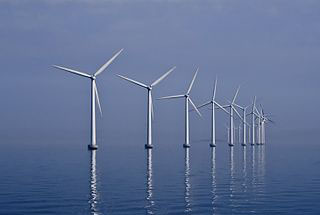(Bloomberg) — For decades, alternative energy was the province of activists. It was far more expensive than fossil fuels, and many remained unconvinced of humanity’s role in the globe’s rising temperature.
When world leaders gather in New York on Friday to sign the Paris climate accord, they will do so against a changing backdrop. As the cost of wind and solar power has plummeted, the solid consensus against alternative energy in the U.S. Republican Party has begun to crack.
The leading Republican candidates for president, Donald Trump and Sen. Ted Cruz, reject any role of humans in global warming, as do most party leaders. But a small and growing number of once-skeptical Republicans are embracing wind and solar. They see the clean energy sources delivering cheap electricity, bolstering America’s energy independence and fueling economic development in impoverished rural areas.
In turn, renewables are adding jobs in North Carolina, Georgia and Texas and other conservative states, creating a formidable clean-energy constituency in a party whose energy mantra was “drill, baby drill.”
“This is going to change the discussion,’’ said Bob Inglis, a former six-term Republican congressman from South Carolina who now runs an organization promoting free-market solutions to climate change. “What I sense among Republicans is there is some belief that, yes, this does sound like a song we could sing.’’
The shift comes as at least 130 countries are due to sign the Paris accord at Friday’s United Nations ceremony, a record for the most countries to sign a UN agreement on the opening day. The deal, brokered in December, calls for nations to reduce pollution in a bid to limit global warming to 2 degrees Celsius (3.6 degrees Fahrenheit) above temperatures at the outset of the industrial revolution.
It won’t be easy. Even with the falling price of clean power, it will cost an estimated $12.1 trillion over the next 25 years for all 195 nations that have said they will sign the agreement to meet their targets, according to Bloomberg New Energy Finance.
Past Support
Support for clean energy is not new for all U.S. Republicans. Some conservative state lawmakers in Iowa, Texas and elsewhere have long promoted it. When he was governor of Texas, George W. Bush pushed through legislation requiring utilities to buy renewable power, leading to widespread development of wind farms.
Republican enthusiasm is based largely on economics, not climate science, and does not necessarily translate into support for the Paris agreement or other efforts to curb greenhouse gases.
Senate Majority Leader Mitch McConnell, a Republican, has warned that President Barack Obama’s plan for cutting power-plant emissions would eliminate as many as 250,000 jobs and raise costs in more than 40 states. Trump has derided wind farms. Cruz wants to remove barriers to oil and natural gas drilling.
Still, there is a kind of confluence of interests since clean energy has been an economic boon for many Republican districts.
Wind and solar farms are often built on farmland, which is typically flat, cheap and treeless. That has provided rental income for farmers and created a groundswell of construction jobs. Wind and solar companies employed nearly 300,000 people in the U.S. in 2015, roughly four times more than the coal industry. All of the top 10 wind-energy producing congressional districts are represented by Republicans, according to The American Wind Energy Association.
“It gives us a real leg up on economic development,” said Iowa Governor Terry Branstad, a Republican whose state ranks third nationally in wind energy.
A push for renewables, meanwhile, is bubbling up from within party ranks.
The congressional Climate Solutions Caucus, with both Democratic and Republican members, held its first meeting at the Capitol this week. “From rising sea levels to ocean acidification, it is evident that South Florida is at the frontline of climate change,” Representative Carlos Curbelo, a Florida Republican, said in a statement. "We need to prepare for sea level rise and advocate for clean energy solutions that can compete in a free market.”
In Arizona and Georgia, grassroots organizations – including one founded by Barry Goldwater Jr., son of the 1964 presidential candidate – have advocated for solar to counter what they see as the monopoly power of traditional utilities. Conservative groups in Michigan, North Carolina and Ohio have emerged to promote clean energy. Conservative entrepreneur and philanthropist Jay Faison launched a super-PAC and plans to raise $5 million this year to support Republicans in congressional races who favor renewables.
"The left has owned the clean energy debate for too long," Faison said in March. His foundation, ClearPath, found in a poll last year that 72% of Republican voters support increased development of renewables.
Republicans like to say they don’t object to clean energy but to propping up an industry at tax-payer expense. Spencer Abraham, a former Republican U.S. Senator from Michigan who served as Bush’s first energy secretary, refuted the notion that his party’s view on clean energy was changing.
“Republicans have always been an all-of-the-above party when it comes to energy while the Democrats have been only about renewables,” Abraham said in an interview.
Government Subsidies
Meanwhile, clean energy has become less reliant on the government subsidies that fueled its growth, making it a less problematic issue for Republicans.
The average long-term contract price for wind power paid by utilities has dropped 60% since 2009, falling in some instances below $20 per megawatt hour. Those prices, which include subsidies, are on par with off-peak power prices in some regions, BNEF analyst Nathan Serota said. The solar price drop has been even steeper, falling 65% with contracts as low as $37 per megawatt hour, Serota said.
A Texas Believer
Drew Darby, a Texas state Republican representative whose district encompasses nine counties at the edge of oil country, said the proliferation of cheap wind power since the state spent more than $7 billion on new transmission lines has made him a believer.
“Republicans all over the country ought to be paying attention to what Texas did,” Darby said in an interview.
Inglis, the former congressman from South Carolina, said Republicans have long assumed that moving away from fossil fuels would entail drastic economic pain and “sitting in sackcloth and ashes.” That’s changing with the falling prices, he said and views on global warming may follow.
“The problem with climate change is that the conversation started on the left," he said. “It was facilitated by the UN. And the key players are godless scientists and government bureaucrats. But now the cost crashes in clean energy are making it a very attractive move.”




